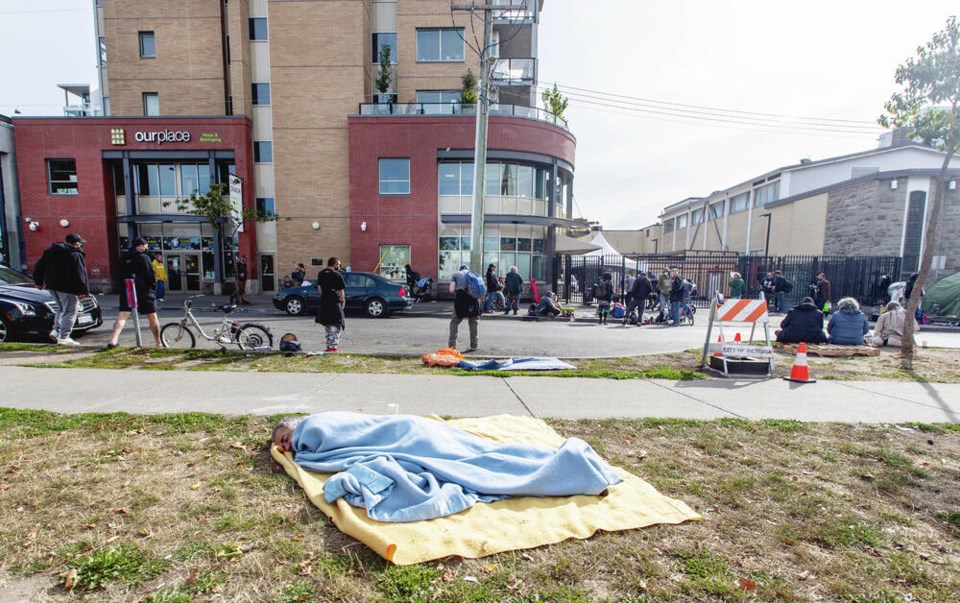I have had it with letters to the editor that seem to be trying harder and harder to be nastier and nastier about people who are, for whatever reason, down on their luck and living on the street.
Too often, recently, I have seen references to such people as “bums,” or worse, “undesirables.”
Not only is it nasty, intolerant and dehumanizing, it seems to me that in attempting to arouse animosity towards a particular group of disadvantaged people, it verges on and may indeed be hate speech.
We should not forget that in Nazi Germany, Jews, Gypsies, homosexuals, people with developmental disabilities and others were considered to be undesirable, and we know how that ended up.
We need to remember that the people on the streets are our fellow human beings, not bums, not undesirables. They are somebody’s son or daughter (almost two-thirds identified as male), perhaps somebody’s sister or brother, mother or father. They end up on the streets or in the parks for a variety of reasons, but rarely is it because they have decided they want to live there.
So let me remind you who is on the street or homeless — at least, who was when the homeless count and survey was last conducted — and why they are there.
On the night of March 11, 2020, at least 1,523 people were experiencing homelessness in Greater Victoria. Of those, only 270 were unsheltered, while 350 were in emergency shelters and the rest were couch-surfing, in public facilities such as halfway houses or hospitals or — about one third of the total — in transitional housing.
The night following the count, just over half of those counted participated in the homeless needs survey. Four in five had been homeless for more than six months, 42 per cent had lived here five or more years. One important factor was that “1 in 3 were in government care as a child or youth” and a third of them “became homeless within a month of leaving care.”
More than one third (35 per cent) were Indigenous, even though Indigenous people only make up five per cent of the Greater Victoria population. Of those, almost half were women, almost three-fifths first experienced homelessness as a youth, more than half had experiences with foster care and more than three in five had a personal or close family history of attending residential school.
Now this is not to say that there are not people on the streets — not all of whom are necessarily homeless, by the way — who may have violent tendencies. I agree that for the safety of the public, and for their own safety for that matter, they should be off the streets and in some form of custody, where as one letter writer noted, “they would be housed and fed and, hopefully, rehabilitated.”
There are certainly people whose behavior can be odd, uncomfortable to be around. But that does not make them dangerous, and it is not helpful to give the impression that people living on the streets are all dangerous and undesirable.
For most, if not all, life on the street is unpleasant, miserable, hard and can be quite scary and dangerous. Street-involved people are themselves vulnerable, at greater risk of being victimized by criminals, more likely to be victims of violence
It is even worse if you have a mental-health problem, a substance-use problem or an acquired brain injury, never mind if you have two or even all three of those problems together. Among those surveyed in March 2020, 62 per cent had a substance-use issue, 59 per cent a mental-health issue and 29 per cent an acquired brain injury. Undoubtedly those problems contributed to them being homeless, which then makes their health problems worse.
So where is the compassion for people who have hard lives, have often had hard lives for years, and need to be helped and supported? As another letter writer reminded us recently, “How a society treats its most vulnerable is the measure of its humanity.”
What we call them matters, and tells us a lot about ourselves. The people who have this attitude really should be ashamed of themselves, not proud to trumpet their intolerance and inhumanity in public.
Dr. Trevor Hancock is a retired professor and senior scholar at the University of Victoria’s School of Public Health and Social Policy
>>> To comment on this article, write a letter to the editor: [email protected]



